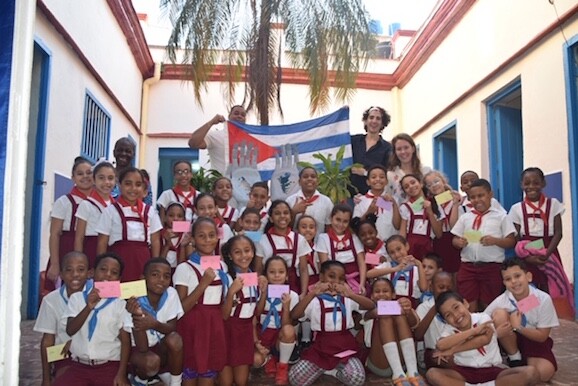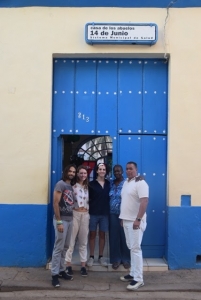
The following post was written by Global Gap Year Fellow Jacob Gerardi. Jake is spending the first half of his Gap Year in Cuba.
As an American volunteering abroad, the question of the ethics in doing so frequently arises in my head. The idea that three months of my time as a degree-less eighteen-year-old learning to stretch my wings would make any tangible difference in the life of a community abroad is nearly farcical. At the beginning of my time in Cuba, three months seemed like an infinity. I had never before spent so long in any location, save for my quiet hometown. Now, however, when I have only nine days remaining in my time here, I feel as if the time couldn’t have gone faster. With this, I am left to question the long term impact of this mini-epoch of my life. I do not doubt I’ve grown tremendously in this time, and taking a gap year has been the best choice I have ever made for my future. Still, for those I work with here, what is the long term benefit?
Upon arrival in Cuba, Ella and I began laying the groundwork for our roots here quickly. We traversed every section of our neighborhood, Vedado, as well as much of Centro Habana, La Habana Vieja, and to a lesser extent the other neighborhoods of the city. We made friends with other students from abroad who we met in our Spanish class, and our volunteer work began. At first, of course, everyone was a stranger. I had only a basic handle of Spanish, making it difficult to understand the elderly people and the schoolchildren who Ella and I have been working with here. Every time we arrived at La Casa de Los Abuelos (literally – “house of the grandparents”, better translated as an idiom, an elderly people’s home), we exchanged besitos with all of the home’s residents. What began as a pleasantry soon became one of the best parts of my day as I chatted with all the grandparents about how they were or what they had been up to. Within about a month, they all knew our names and a bit about us, and us the same for them.
The same happened with the children we were working with, with whom we began to develop relationships. We no longer needed to explain at the beginning of every class what our names were, where we were from, or why we were there. Whenever we saw the kids, even in the streets, they would smile and shout their Spanish interpretations of our very English names: Eela! Jayke! Within a month after arriving in Cuba, I finally felt that we were settling into a real-life in La Habana. With friends both local and foreign, events and concerts to attend, lessons to plan, TV to watch, and Spanish to study, it seemed everything had fallen into place. Soon, however, the time began to move too quickly. In November, we made a five day trip to Mérida, Mexico to renew our visas, and about a week later Ella’s family came to visit. Before I knew it, it became December 1st, and my time remaining here dwindled to two weeks, as it continues to dwindle towards my departure date of December 15th.
Walking back from the school where we pick up to the children for lessons to La Casa de Los Abuelos, the house’s social workers and our good friend Margarita asked us “por cuántos años ustedes van a estudiar en Cuba?” – for how many years are you all going to study in Cuba? We had both been clear from the start that our time in Cuba was limited to three months, but that didn’t stop the information from being lost along the way. “Por tres semanas más”, we replied sheepishly, “for three more weeks”. She frowned, and responded in Spanish, “We are all going to miss you”.

The idea of leaving those who we have made relationships with here is so painful. Neither Ella nor myself have a foreseeable future in Cuba, with years of university ahead followed by jobs with which we have no idea what to expect. It is for this reason I question the ethics of such short term volunteering. When the kids we teach remember Americans or hear of the United States in the future, will they remember the three months they spent with the volunteers who they seemed to like so much, or will they remember the fact that we left so quickly, leaving nothing more than memories, a group photo, and a Spanish to English list of useful vocabulary words? When they remember us, will they feel happy for the time we spent together, or feel sadness or disdain that we departed so quickly, on to another destination in our pre-college volunteer exploits? To be honest, I don’t know the answer to this question, and it troubles me to think of it.
Global volunteering is typically a well-intentioned venture. It comes out of a desire to work with others, paired with a desire for seeing new places and cultures, learning new languages. For whatever our reasons may be, fifteen of us from UNC departed on gap or bridge years, taking on something both challenging and rewarding. Still, I cannot help but to think we benefit more from this opportunity personally than anything else. Living in Cuba has caused my perspective to widen, and I have grown tremendously from it. Is global volunteering helpful? I would like to think that yes, it is. But it is not anymore necessary than volunteer work back home, where scores of charity organizations struggle to fill their ranks as individuals prefer short, exotic expeditions to faraway ‘volunteer’ placements. The nature of UNC’s Global Gap Year Fellowship leads us instead to identify long-term, partnership-built charity placements. We strive to use existing volunteer infrastructure rather than create new programs then promptly abandon them. We are intended to contribute to communities, to lend a hand where one is needed, and open everyone’s perspectives through global exchanges. We work to change the often negative perception of Americans abroad. Nonetheless, I struggle to ponder as I prepare to leave Cuba, what, if anything, is the long term benefit of such work on the communities we work in?
